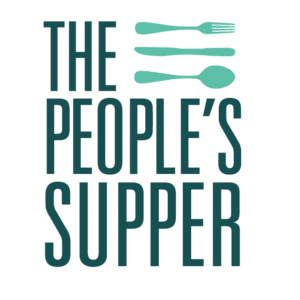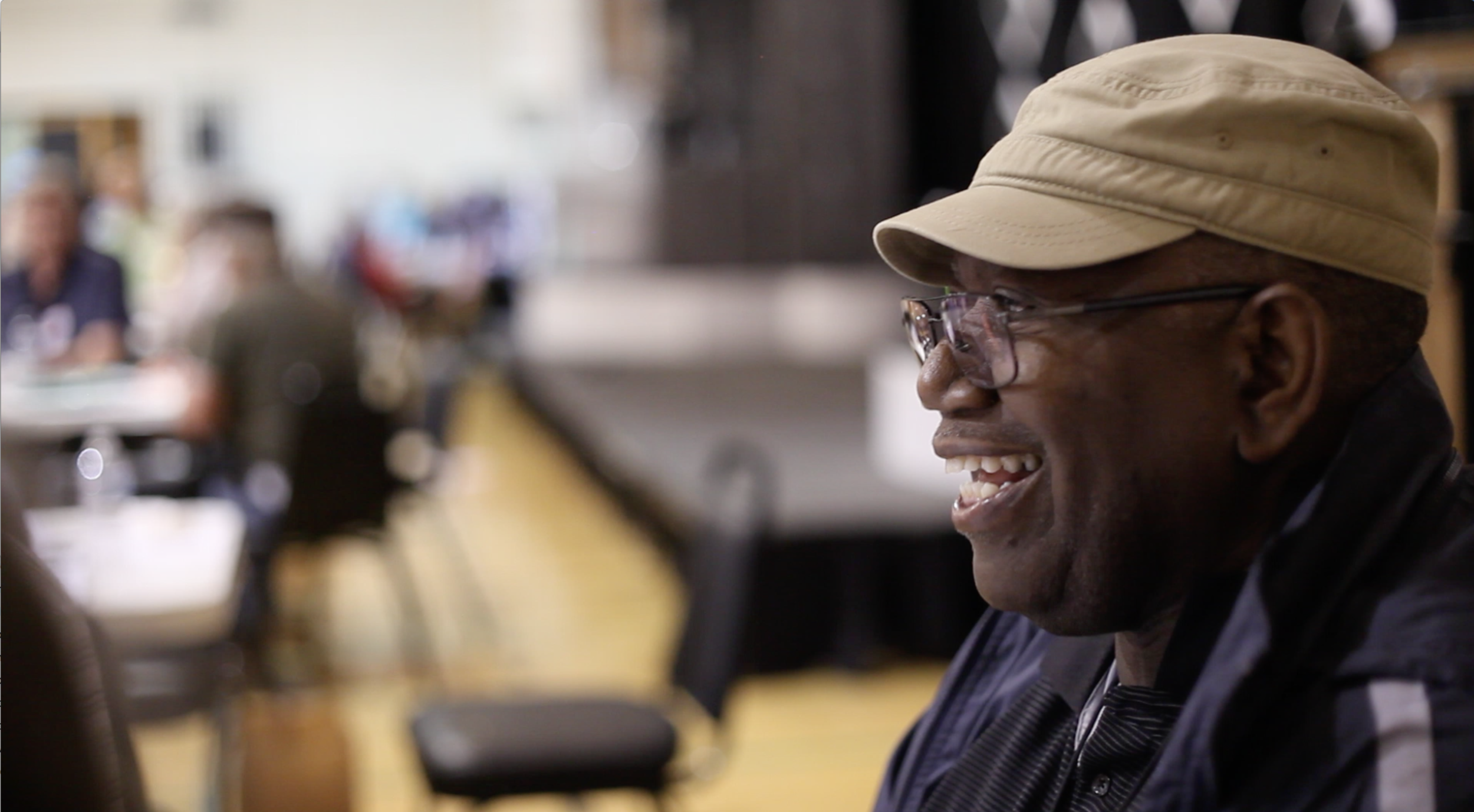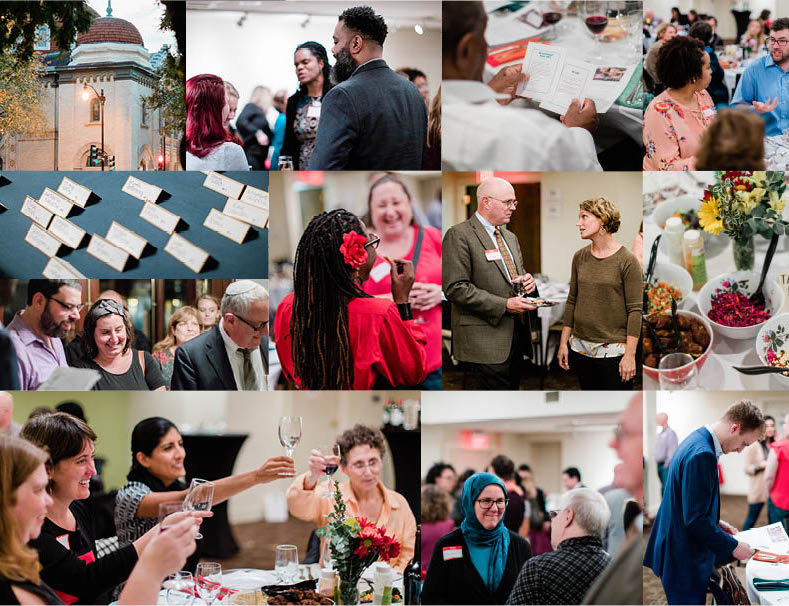We use shared meals to build trust and connection among people of different identities and perspectives.
We believe that social change moves at the speed of relationships, and that relationships move at the speed of trust. Our work is anchored in a simple question: What needs healing here?
Our work tends to span three types of communities and gathering spaces:
Multiracial communities that are actively reckoning with how to build a more equitable future
This supper series is designed to help community leaders break down barriers and deepen trust and understanding of one another across lines of difference of race and identity. By tackling subjects we tend to avoid head-on, we aim to identify shared fears and the barriers that keep us from collaborative action, in order that we may overcome those fears and work toward solutions.
The series is intended for any established multiracial community — local government & civic groups, faith-based organizations and communities, colleges & universities, and workplaces — who wish to have an honest conversation about race, and to chart a collective path forward.
We find that abstract goals like “community-building” are rarely a sufficient enough reason to get folks to show up, let alone chart a path toward real change. This works best when there’s an acute pain point — in Erie, PA, it was a 2017 article that named the city the worst in America for African Americans to live, in Northern VA, it was a photo of the governor dressed in blackface, followed months later by the murders of Ahmaud Arbery, Breonna Taylor, and George Floyd. As we grapple with an uninterrupted history of racism in America, most of us can point to an acute pain-point today: disagreements that erupt into online name-calling, expressions of overt and covert racism, police violence, and the effects of present-day and historic segregation to name a few. And we can begin the work together to imagine a different way forward.
Case Studies: The Mayor’s Office of Erie, PA | Office of brooklyn borough President eric adams | Clergy United for Racial Empathy (CURE) | UMass Amherst’s Advocacy, Inclusion, and Support Programs
Communities facing acute polarization, who wish to cultivate deeper bonding & bridging ties (ie: reduce the suck)
We’ve got a lot of healing to do, America. In a moment when our social media feeds resemble a toxic waste dump, we’re teaming up with communities across the country that wish to chart a different path forward.
Over the last few years, researchers have begun studying how communities respond to natural disasters. They expected to find that survivability — let alone the capacity to rebuild — depended on access: how quickly you were able to access emergency services, and your overall wealth. But that wasn’t the case. In the face of catastrophe, the most important variable is the density and strength of a person’s social network: what are known as bonding and bridging ties. In the face of disaster, you can’t wait for your family member across town. What matters is how much you trust your neighbors, and whether folks are willing to lend each other a hand.
“During a shock, what drives how we do has to do with the connections we have,” says Dr. Daniel Aldrich, a professor at Northeastern who studies community resilience and disaster preparedness.
We help communities use the supper table as a way to cultivate that kind of connection and community across difference, providing an all-too-rare opportunity for people to hear the stories that make us who we are, and to transcend all the labels and stereotypes and assumptions we make of one another along the way.
Case Studies: SILVER THREAD PUBLIC HEALTH | The Next 75, Oak Ridge Ministerial Association | The MIDTERM FIVE
Conferences & Convenings
Want to talk about something more interesting than the weather and your business cards?
We’ll partner with you to design a People’s Supper for the guests at your next conference or gathering, as a chance to go beneath the surface, and connect meaningfully with one another, sharing stories not of what we do, but why we do it. We can lend a hand on all logistics, as well as design and content development, crafting questions and appropriate guidelines, developing a project plan with tips and checklists, and training staff and table hosts.
We’re also available for keynotes and onsite event execution, as needed. Email us at info@thepeoplessupper.org.
CASE STUDIES: Obama foundation Summit, 2017 | Greater Giving Summit, The Bill & Melinda Gates Foundation | LA Education Exchange, USC Center EDGE
CASE STUDIES
Racial Justice Journeys
The Mayor's Office of Erie, PA
In 2017, a USA Today article named Erie the worst place in the country for African Americans to live. So the Mayor of Erie reached out to us wanting to do a series of racial and ethnic healing suppers, underwritten by the town’s lone Fortune 500 company, Erie Insurance.
We teamed up with the Mayor’s Office on a series of racial healing suppers. Over the course of six months, a mix of racially and ethnically diverse civic leaders — 80 in all — sat down for a seven-part series of bridging suppers across racial difference, and affinity suppers among folks who shared a common identity.
At the end of the series, participants came up with action steps to make Erie more equitable. The series concluded with a gathering of more than 260+ people in the city’s Convention Center for the final “People’s Summit”. There, dozens of Erie residents stood up and offered commitments, sharing publicly how they could be helpful to one another, as they work collectively to combat racism and systems of oppression in the city. We’re continuing to work with the city’s new Better Together Council, which grew out of the series, to put those ideas to practice.
Among the outcomes we’ve seen so far: the launch of a small business incubator program for New Americans and BIPOC in Erie, which includes capital funding and an accelerator program; a forthcoming multimillion-dollar scholarship fund to ensure all Erie students have access to higher education; and cultural competency trainings for the fire department, police department, and all public works employees, as part of a growing language access program.
The Office of Brooklyn Borough President Eric Adams
In January 2020, The People’s Supper teamed up with the office of the Borough President to launch Breaking Bread, Building Bonds, in response to a wave of anti-Semitic hate crimes throughout New York City. What began as an in-person series moved online in May. Over the course of the year, we're hosting 100 suppers among everyday New Yorkers from across racial, religious, and economic lines, for a chance to expand their understanding of one another.
We recognize that hate is its own virus, fueled by uneducated fear and failing to see our common bonds, and that as the twin pandemics of COVID-19 and racial injustice have made all too clear, our ability to meet this moment depends on our levels of trust and sense of common bond.
To date, SAGE, New York Peace Institute, St Francis College, Project Reach of the Chinese American Planning Council, Anti-Defamation League, Filomeno Foundation, Neighborhood Improvement Association (NIA), P.S. 227, Church of the Evangel, Flatbush Jewish Center, The Divine Light Awakening Center, and National Sawdust have participated and hosted.
Clergy United for Racial Empathy (CURE)
In May 2019, a few months after a photo surfaced of Virginia Governor Ralph Northam in blackface, a group of multi-faith clergy throughout Northern Virginia embarked on a three-day bus tour to explore the history of racial injustice in Virginia. The goal was two- fold: to learn the history that is often omitted from our textbooks, and to build deep relationships with one another.
Upon their return, 12 of the congregations decided to launch a People’s Supper series. Clergy leaders invited members from their faith communities to gather to broaden and deepen their relationships across the community. In the end, 120 participants committed to a five-supper series on racial equity.
They began with a bridging supper in early 2020, and paused the series when the pandemic struck. As they waited for permission to gather again in-person, Breonna Taylor and George Floyd were murdered by the police. The organizers realized this work could no longer wait, and worked alongside The People’s Supper to move the series online. The affinity suppers were framed with moments to acknowledge these deaths at the hands of the police, and with an invitation to recommit to the work of self examination in one another’s company through this series.
After two virtual affinity gatherings, the group is preparing for their final bridging supper at the time of this writing. Participants have articulated their commitment to next steps and desire for deeper engagement toward racial equity in Virginia together beyond this series. Already, two men who met at the series have committed to meeting with one another regularly for continued discussion. Another woman committed to teaching her neighbors about Juneteenth each year, making sure that her predominantly white neighborhood would be given the chance to learn a more complete history. A group of participants joined together in a Juneteenth Tikkun service hosted by a local synagogue. Other participants are connecting with one another in various ways as they work toward racial justice in their communities.
UMass-Amherst’s Advocacy, Inclusion, and Support Programs
In March 2019, co-founders Lennon Flowers and Jennifer Bailey co-led a People’s Supper on race for 70 undergraduate students and faculty/staff, as part of the university’s Advocacy, Inclusion and Support Programs. With on-campus hate crimes on the rise nationwide, UMass-Amherst was subject to 19 reported of acts of hate during the Fall semester, and the campus longed for an opportunity to meaningfully come together, inviting students and faculty alike to examine their relationships to racial identity, and what it will take to ensure that others feel fully seen and heard in the community.
Depolarization & Cultivating Stronger Bridging Ties
Silver Thread Public Health
In the Fall of 2019, we teamed up with the Silver Thread Public Health Department in Mineral and Hinsdale Counties in rural CO on a yearlong series of suppers as part of its prevention programming, out of a recognition that social isolation is inextricably linked with rising rates of suicide, opioid addiction, and civic disaffection.
People in Creede and nearby Lake City — each with a population of less than 400 people — consider themselves insulated from what’s happening “out there”; they’re not quick to talk about politics or what’s happening in Washington, DC.
But when you press them, they’ll share that things are a little more fraught than they used to be. They’ll tell you about the recent ordinance over off-road vehicles, and the fights on Facebook. They’ll tell you that tempers feel shorter now, that people are quick to erupt. But they’ll also tell you that this is a place where people take pride in helping each other out: in bagging sandbags when the rains come, and looking out for each other’s kids. They’ll tell you about the ways neighbors have lent a hand and dropped off food to those hard-hit by the pandemic, even as fights about mask-wearing dominate their social feeds.
Over the course of four suppers, 151 people in Creede (or 43% of the population) participated at least once, and 56 people (16% of the population) participated in two or more. Of the participants — who ran the political spectrum — 97% agreed or strongly agreed that, "At the supper, I felt that others listened deeply to what I had to say," and 94% agreed or strongly agreed that, "As a result of attending the supper, I felt more connected to others."
The Next 75, Oak Ridge Ministerial Association
In 1942, the government seized 60,000 acres in eastern Tennessee, turning a farming community into the city of Oak Ridge. Dubbed the “Secret City”, Oak Ridge was defined for its first 75 years by its role in the Manhattan Project. But like the American story itself, it’s a story defined no less by whose voices weren’t heard, and a legacy of secrecy, segregation, and mistrust, intermixed with an abiding civic pride.
As the town enters its next 75 years, The People’s Supper and the Oak Ridge Ministerial Association are bringing together folks across racial, political, socioeconomic, generational, and religious differences, to build trust and connection among people of different identities and perspectives. Together, we wish to answer a single question: What do Oak Ridgers wish to be known for over the next 75 years? That question cannot be answered by one voice, or one institution. It requires enlisting the many hidden voices — and hidden lives — that comprise this town.
Along the way, we’re following a handful of residents and the very different worlds that coexist in one, as they confront the legacy of segregation, and grapple with the present-day effects of that history and the question of how to move forward. The project’s success depends on viewers seeing themselves reflected, and realizing that what’s happening in Oak Ridge is not the story of one isolated group of people, but part of a shared story, as communities across the country seek to uncover uncomfortable truths, and to forge the trust and relationships necessary to carve out a collective path forward.
The Midterm Five
The hard thing is rarely what happens at the table; it’s getting people there. We chose to leverage the midterms and the heightened tensions between neighbors that attended it, calling the series The Midterm Five. In the five weeks leading up to the midterm elections, we hosted five large-scale suppers in Grand Rapids, MI, Creede, CO, Washington, DC, Charlotte, NC, and Staten Island, NY. Our goal was simple: In a moment of acute political division, we sought to prove that a group of thoughtful people who differ from one another — politically, culturally, racially, generationally, religiously, and economically — can sit down over a shared meal and engage in a meaningful conversation together.
Rather than rely on individual hosts, we created Host Committees, enlisting people whose jobs involved bringing people together. Many of our best Host Committee members were people we cold-called, identifying leads through a combination of research and network-mapping. We built personal relationships with each committee member and deepened relationships across each team with everything from team calls to group dinners.
The results were some of our best work to date, both in terms of meaningfully engaging participants across the political aisle — 43% identified as conservative or moderate, and 16% identified as conservative or very conservative — and outcomes. Of survey respondents, 96% would recommend TPS to a friend; 93% reported feeling more connected to others; and 80% felt a rise in empathy toward people who are different from them.
Conferences & Convenings
Obama Foundation Summit, 2017
In October 2017, we hosted a supper for all 450 attendees at the Obama Foundation’s inaugural summit. President Obama and Mrs. Obama each facilitated a People’s Supper at their respective tables, with guests who included Prince Harry, Caroline Kennedy, Valerie Jarrett, and Rashida Jones. After some initial concern that the supper would be “hokey,” President Obama requested the Secret Service give him “just five more minutes,” not once but twice, before bringing his table’s conversation to a close. TPS Co-Founder Rev. Jen Bailey delivered the evening’s keynote.
Greater Giving Summit, The Bill & Melinda Gates Foundation
We hosted a 150-person People’s Supper at the Foundation headquarters in Seattle, as part of their Greater Giving Summit. “The People’s Supper was very much the heart of the event and we have had such wonderful feedback from people on it,” wrote Victoria Vrana, Deputy Director of Philanthropic Partnerships, after the event. “The need and desire for connection is just palpable and the very thoughtful and powerful design of the supper made that real in ways that I don’t think anyone expected.”
LA Education Exchange, USC's Center for Engagement-Driven Global Education (Center EDGE)
The Center was preparing to bring together LA’s leading voices in education for a day and a half of best practice-sharing and collective problem-solving, and approached us with a challenge: How might we help participants build the trust necessary to talk openly about what's working and what's not? We worked with the team to craft questions and experiences that would provoke the kind of conversation and connections that went beyond business cards and stump speeches, or arguments about one approach over another. The supper was the highest rated component of the gathering.
We returned in May for a half-day summit they held with LA’s educators and storytellers, exploring how we might deploy the knowledge and expertise housed within our sprawling city to tell a better story — about what great education looks like, and why we each have a shared responsibility to ensure every child has equitable access to it.











